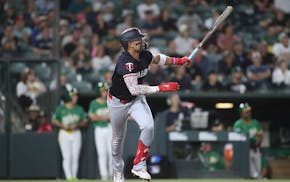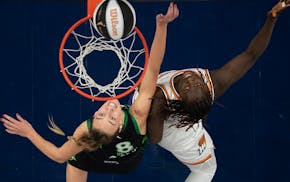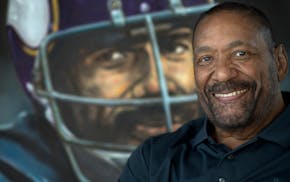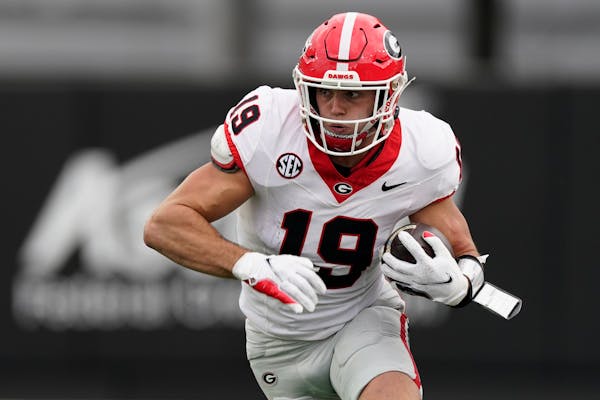This is the sixth in a series of position previews for the 2024 NFL draft, which begins Thursday. Today: Quarterbacks.
Offensive line | Edge rushers | Receivers | Running backs | Tight ends
Vikings' outlook
Consider the Vikings' actions at the quarterback position over the past two years since Kwesi Adofo-Mensah and Kevin O'Connell came to Minnesota. In many ways, the decision they will make on Thursday night is one they've been building toward since Adofo-Mensah and O'Connell arrived.
O'Connell's history with Kirk Cousins led the Vikings to keep the quarterback, then 33 years old, as their starter for two seasons. Cousins thrived in O'Connell's offense, leading the Vikings to a 13-win season in 2022 before putting up some of his best statistics in the first half of 2023 before a torn right Achilles ended his season. He and O'Connell grew close personally, the coach empowered him as a leader, and fans warmed to Cousins, particularly in 2023. But the Vikings never committed to Cousins.
They offered him a one-year extension in 2022 and added two void years to his contract in 2023 when the sides were unable to agree on a long-term deal, ensuring he'd hit free agency after the season. Though they wanted to re-sign Cousins for 2024, the Vikings' offers to him came without the guarantee structure Cousins desired, just as they had in 2023. Cousins left for the Falcons in free agency, and the Vikings signed Sam Darnold as an immediate replacement while they sought a long-term solution.
The Vikings' approach with Cousins was always colored by the franchise's intrigue about selecting his successor: a young QB whom O'Connell and the Vikings' offensive staff could develop into the kind of decade-long fixture at the position the Vikings haven't had since Fran Tarkenton. Since Teddy Bridgewater's knee injury led former General Manager Rick Spielman to trade a first-round pick for Sam Bradford in 2016, the Vikings have spent eight seasons paying market-rate prices for veteran QBs, with only five playoff games and two victories to show for it. Vikings ownership was also said to be allured by the short-term competitive boost that can come with a productive QB on a rookie contract, allowing teams to spend aggressively in free agency while enjoying cost control at the game's most important position.
Minnesota liked the three QBs at the top of last year's draft (Bryce Young, C.J. Stroud and Anthony Richardson), and explored a move up to take one last year, before all three passers were gone in the first four picks. A deep 2024 QB class, though, meant the Vikings would get another shot at drafting a player they liked, and with two first-round picks after last month's trade with the Texans, they're in position to move up in the first round and take the highest-drafted quarterback in franchise history.
Vikings' level of need
High. There's a practical and philosophical reason why finding a quarterback is an imperative for the Vikings in this draft.
On a practical level, Jaren Hall is the only Vikings QB signed beyond this year. Could they continue to look for short-term solutions like Darnold? Sure. But they certainly won't want to patch things together at QB in the middle of Justin Jefferson's prime.
And on a philosophical level, Adofo-Mensah and O'Connell are headed into their third season together. Even after 20 wins and a NFC North title in their first two years, they know they'll be measured on what they do at the QB position. It's unlikely they'll want to wait until Year 4 together to acquire a young QB, and the 2025 quarterback draft class might not have as many prospects as this one is believed to have. All signs point to a QB, and possibly to a big move up in the draft to take one.
Five names to know
Drake Maye, North Carolina: The Vikings have been watching the 21-year-old for more than a year, and their new QB coach Josh McCown coached Maye in high school. His arm strength, mobility and willingness to push the ball over the middle of the field are sometimes evocative of Matthew Stafford, with whom much of the Vikings' offensive coaching staff won a Super Bowl in Los Angeles. Maye's accuracy was a concern in 2023, and he'd need to refine his footwork in the NFL, but if the Vikings can get him, there's every reason to think he could be their target.
Jayden Daniels, LSU: He won the Heisman Trophy in his final season with the Tigers, completing 72.2% of his passes for 3,812 yards and 40 touchdowns against four interceptions while running for 1,134 yards. Daniels' athletic ability might be without parallel in this year's class, and it could be why he won't last past the No. 2 overall pick, where the Commanders could take him after Chicago drafts USC's Caleb Williams. For Daniels to end up in Minnesota, the Vikings would have to feel comfortable he can read defenses and throw on time within the structure of a play; his mobility could be a weapon, but the Vikings likely wouldn't build an offense around it.
J.J. McCarthy, Michigan: McCarthy's pro day performance, following his national championship at Michigan, has generated plenty of pre-draft buzz, to the point where many mock drafts have him going in the top five picks after Williams, Daniels and Maye. To be worthy of that kind of draft slot, he'll have to show he can throw with touch and command an offense that leans on him, after he drew on strong support from his defense and running game in college. He answered some questions about his arm strength in the pre-draft process, and he comes from an offense with more pro concepts than some of his counterparts were asked to execute.
Michael Penix Jr., Washington: Arm strength and pocket mobility are Penix's best attributes; his age (24), accuracy and injury history (including two torn right ACLs) could be concerning enough to push him toward the back of the first round. If he can stay healthy and refine some of his mechanics, the left-hander could direct a dynamic offense in the NFL, but he's not without risks.
Bo Nix, Oregon: Nix thrived at Oregon after transferring from Auburn, posting gaudy stats (77.4 completion percentage, 4,588 yards and 45 touchdowns against three interceptions) as a senior. He's already 24, and he'll have to prove he can excel in an offense that requires him to make more difficult throws than Oregon's did, but he's developed as a pocket passer who can make sharp throws on the run when necessary.
One sleeper
Spencer Rattler, South Carolina: He followed coach Shane Beamer from Oklahoma to South Carolina, but never recreated the kind of success there that he had with the Sooners as a freshman. There are concerns about Rattler's arm strength and ability to make plays from messy pockets, but he's shown good mechanics and accuracy. He'd likely come to the Vikings as a bit of a developmental project.

Lewis ends his skid, Castro homers twice as Twins rout A's 10-3

Twins reliever Duran receives recognition for his marvelous May

Lynx roll past Mercury 88-65 to move to 8-0 behind Hiedeman's strong showing

